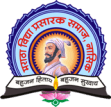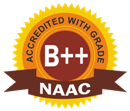Multidisciplinary / interdisciplinary
Our college is affiliated to Savitribai Phule Pune University, Pune. The adoption of the Choice Based Credit System (CBCS) pattern by the University commenced in the academic year 2019-20. In accordance with the Choice Based Credit System (CBCS) framework, the institution provides a range of interdisciplinary non-CGPA courses that emphasise self-learning and value-based education. The subjects of study include Physical Education, Democracy, Election, and Good Governance. The concept of value added refers to the increase in worth or utility that is achieved through a certain process or activity. The courses referred to are additional credit-bearing courses available to first-year students across several academic disciplines. Environmental Studies is a compulsory subject for second-year students across all disciplines, while Generic Electives are optional courses that can be taken for additional credit by final-year students. As per University guidelines our college adopted NEP-2020 for PG classes and for UG classes institution will adopt the National Education Policy (NEP) 2020 starting in the Academic Year 2024-2025, hence introducing a range of interdisciplinary courses. In accordance with the regulations and guidelines set forth by the university, we will adhere to the prescribed protocols. College celebrated NEP-Week as per the guidelines of UGC and also conduct School-Connect awareness programme for 12th Passed students financially supported by SPPU, Pune.
Academic bank of credits (ABC)
According to the National Education Policy 2020, the college intends to adopt the Academic Bank of Credit (ABC) in order to enhance the academic mobility of students. Our institution also implements policy guidelines for the appropriate transfer of credits. The college has implemented the Choice Based Credit System (CBCS) in accordance with the principles set forth by the university. The Savitribai Phule Pune University (SPPU) has informed the college regarding the requisite measures to be taken for the implementation of ABC. A session was organised by the college faculties to ease the opening of DigiLocker accounts and provide detailed instructions for the generation of ABC Id. The institution has designated a faculty member as a Nodal officer to oversee the implementation of the instructions provided by the Savitribai Phule Pune University (SPPU).
Skill Development
In response to evolving workforce demands, academic institutions are compelled to provide students with the necessary training and skills that align with the contemporary requirements of job markets. The development of skills is an integral aspect of education in the 21st century. In order to adequately prepare students for the job market and provide them with the necessary competences to navigate real-world issues, it is imperative that they possess the requisite knowledge, skills, and abilities in both professional and personal domains. The College consistently endeavours to establish a comprehensive educational environment by organising workshops, lectures, interactive sessions, as well as offering additional courses and certificate programmes.
Certain students who have completed accounting and taxation programmes successfully fulfil the requirements set by their employers and secure employment within the financial sector, encompassing banks, credit unions, start-ups, and prominent enterprises. Students that actively participate in organic farming assume the role of mentors for local farmers and provide support to their immediate social circles, including friends and family. Value-added classes are implemented at the department level, aiming to enhance students’ understanding of professional ethics, human values, and social etiquette. The university has approved for two value-added courses from the academic year 2020-2021, for all disciplines namely “Student Solar Ambassador” and “Medicinal Plant Nursery, Floriculture, Gardening, Nursery Techniques, and Vegetative Propagation.”
The college cultural committee offers training programmes to students with the aim of nurturing their talents, which can be further developed and applied in professional contexts. These programmes encompass several artistic disciplines, including dance, music, theatre, writing, and public speaking. A significant proportion of students have undertaken internships and successfully secured positions across several sectors. The college is now implementing the skill enhancement courses as per the curriculum prescribed by the affiliated University. In addition to its academic offerings, the college also offers vocational programmes, including a Bachelor of Vocation (B. Voc) in Electrical Technology. The college also fosters the cultivation of soft skills among students through the organisation of talks delivered by distinguished individuals from many domains. Besides CBCS, the college provides Computer Training Courses for the students.
Appropriate integration of Indian Knowledge system (teaching in Indian Language, culture, using online course)
The college has made the study of Indian languages and culture, as well as the Indian knowledge system, a central part of its curriculum. The College annually celebrates Marathi Day (February 27), Hindi Day (September 14), and English Day (April 23) to pay tribute to the languages and cultures. We have annual collegiate Marathi elocution competitions. The current happenings of the year are the topic of our annual gathering. Annual poetry competitions often feature a social justice theme.
The college has made a number of changes to its curriculum to better reflect the Indian knowledge system. We adopt a bilingual approach to education here at our college. We use the same medium to teach all three languages (Hindi, English, and Marathi). The curriculum includes instruction in the lingua franca and the literary canon of the era. The business communication and science courses are offered in English, whereas the social science courses are given in Marathi. Clarity of expression is the primary motivation for adopting a multilingual strategy.
To keep in touch with our Indian Knowledge System, Dept of History organised 15 days workshop on Modi Lipi.
Students are encouraged to keep in touch with their Indian heritage through contests involving essay writing, poetry, public speaking, folk song, folk dance, and skit. Through cultural programme like “Yuva Spandan” students presents rich cultural heritage of the country.
Focus on Outcome based education (OBE)
The primary objective of this college is to prioritise outcome-based education. This educational college provides effective instruction to its students by aligning its curriculum with the programme outcomes (POs), programme specific outcomes (PSOs), and course outcomes (COs) specified in the syllabus for each programme as mandated by the affiliating university. Since the academic year 2019-20, Pune University has successfully implemented the CBCS-Revised. The institution has successfully adjusted its approach to curriculum design and instructional practises to align with the principles of Outcome-Based Education (OBE). Annually, the college organises an event when alumni and parents convene to engage in discourse pertaining to outcome-based education. The implementation of outcome-based instruction is a necessary component in science laboratories, computer laboratories, and language laboratories. Field excursions and project activities facilitate the development of a broad perspective among students. The syllabi provided a diverse array of subject matter, incorporating various educational methods such as internships, field visits, research projects, presentations/seminars, quizzes, and demonstrations. Every programme offered by the College is designed to effectively achieve the Course Outcomes (COs), Programme Specific Outcomes (PSOs), and Programme Outcomes (POs) through a well-balanced blend of content and activities. Experiential modules, such as field visits, internships, and laboratory sessions, facilitate the development of frameworks that establish connections between theoretical knowledge and practical application for students. These practises are designed to facilitate the achievement of desired learning objectives, while actively involving students in the learning process through various instructional methods.
The pedagogical approaches and assessment methods that prioritise the learner’s needs and goals are developed with careful consideration of the desired learning outcomes, which are effectively conveyed to all relevant parties involved. The institution has implemented strategies to evaluate the degree to which the programme outcomes (graduate attributes), program-specific outcomes, and course outcomes (POs, PSOs, and COs) have been attained.
Outcome-Based Education (OBE) is an educational framework that involves the reorganisation of curriculum, pedagogy, and assessment methods to prioritise the attainment of advanced levels of learning, rather than a simple collection of academic credits. The conventional education system prioritises the content being taught, but Outcome-Based Education (OBE) places greater emphasis on the acquisition of knowledge and skills by the students, hence adopting a learner-centered approach.
The student induction programme encompasses an introduction to the theoretical framework of outcome-based education, together with a comprehensive elucidation of the curriculum outcomes tailored specifically for the students. The curriculum of the institute explicitly articulates the Programme Outcomes (PO), Programme Specific Outcomes (PSO), and Course Outcomes (CO). Moreover, the teaching-learning pedagogy employed at the institute effectively incorporates Outcome-Based Education (OBE), with the aim of fostering the development of responsible citizenship among the students.
The input provided by students is utilised to build an action plan with the aim of enhancing academic performance in subsequent periods.
Distance education/online education
Since the year 2019, educational institutions within the country have implemented digital platforms as a means of facilitating interactive lessons, organising conferences, and conducting meetings, among other activities. Despite the potential drawbacks associated with the absence of in-person instruction, online education has effectively transcended geographical limitations by facilitating the exchange of knowledge and fostering collaboration between professionals and students situated in disparate regions. The post-pandemic reopening of educational institutions has facilitated the adoption of a hybrid method of education known as ‘PHYGITAL’, which integrates both online and offline resources. The concept of the “new normal” is also reflected in the New Education Policy. As a result of the knowledge acquired during the period of Covid-19 closure, limitations pertaining to the availability of online resources for both educators and students will no longer pose a hindrance. In addition to the aforementioned amenities, our institution boasts a study centre affiliated with YCMOU. The college has made worthy additions to its physical and ICT resources like Interactive Panel.
The college possesses ample familiarity with virtual and blended learning methods and is confident in its ability to meet the requirements outlined in the National Education Policy (NEP).
- Report NEP 2020 Connect 2024
- NEP 2020 National Conference Feb-2023
- NEP 2020 Week Report
- Induction NEP 2020 Program Report 2024-25

